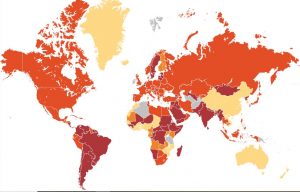Since the beginning of this pandemic, restrictions on freedom of movement were slowly but surely put in place as world leaders grappled with the implications of this virus. Governments understood that their best weapon against the spread of COVID-19 was glaringly double-edged. On one edge, restrictions on travel and work slowed the spread of the virus, saving many lives and allowing time for healthcare systems around the world to better handle their caseloads. On the other edge, many countries would experience economic turmoil as their workforces would either be converted to work from home or laid off. Thus, with their backs against the walls, most leaders chose to shut their countries down. Travel restrictions were put in place, companies trimmed their fat to compensate for the upcoming loss in revenue, entire workforces were converted to work from home.
Fast forward to now, and the global storm which has plagued humanity for the past year and a half has finally revealed a glimmer of light. Vaccines to fight COVID were finally introduced to the public late last year. Over 2.5 billion doses of vaccines later, we are beginning to see entire regions of the world reaching herd immunity status and countries lifting their travel restrictions. Now more than ever we must now ask ourselves the ethical question that lies ahead. Not when, nor if, but should we travel abroad to work?
This piece will place the spotlight on those who work abroad and more specifically, our peace fellows in the field. At the Advocacy Project, we place a strong emphasis on our peace fellows. They are the eyes, ears, and hearts that run our projects. However, some projects require peace fellows to be in the field working alongside our partners rather than at home. In doing so, we circle back to the ethical dilemma many international organizations and workers face. Should we be working abroad? To determine our ethical dilemma, I have chosen to solve it using 2 factors. First, as recommended by Jagdish Khubchandani, a professor of public health at New Mexico State University, we should look at how COVID being handled in the region. This makes sense since if we travel to a country where COVID is running rampant and happen to catch it, it would only serve to exacerbate the already overburdened healthcare system. In comparison, if we travel to a country where COVID is more under controlled and happen to contract it still, we may still seek medical attention from a still stable healthcare system. Second, as per CDC guidelines, workers need to be fully vaccinated, no question. Once we figure out the answer to these questions, then we can determine if workers are ethically absolved of guilt to work abroad.
To begin, at the bare minimum for working abroad, the CDC recommends for you to not travel unless fully vaccinated. To be considered fully vaccinated, you are required to allow at least 2 weeks after your second dose of 2-dose vaccines such as Pfizer and Moderna or at least 2 weeks after a single-dose vaccine such as Johnson & Johnson’s.
Next, to determine how COVID is being handled in a certain region, we can look towards the CDC travel recommendations map that details which nations are safe to travel to. All nations are ranked from level 1 (least dangerous) to level 4 (most dangerous). At level 1, where COVID is low, the CDC recommends that you be fully vaccinated. At level 2, the COVID threat is moderate. Here, COVID is operating at an increased rate to where unvaccinated travelers are at an increased risk of severe illness. At level 3, the COVID threat is rated high, which the CDC recommends that unvaccinated travelers should avoid all nonessential travel to these destinations. At the last level, travel, in general, should be avoided unless necessary.

CDC Travel Recommendations by Destination
So are workers ethical in working abroad during these times? If they are vaccinated, as our peace fellows are, then they meet one of the criteria but what about the other? Utilizing our CDC threat level map, we can look at the 3 states where our peace fellows are stationed: Uganda, Liberia, and Senegal. Of those 3, only Uganda is ranked higher than a threat level 1 for COVID; standing at only threat level 2. Both Liberia and Senegal however, are at a threat level 1. Thus, for our fully vaccinated peace fellows working in regions deemed OK for them to work in by the CDC and as long as they are fully compliant with local and CDC guidelines, are ethically conscious in working abroad.
Posted By Ryan Pham
Posted Jun 21st, 2021


1 Comment
Savannah Kopp
June 22, 2021
This was a really good take on the ethical dilemma we face in a semi-post COVID world. It also puts into perspective the inequities surrounding COVID response measures.